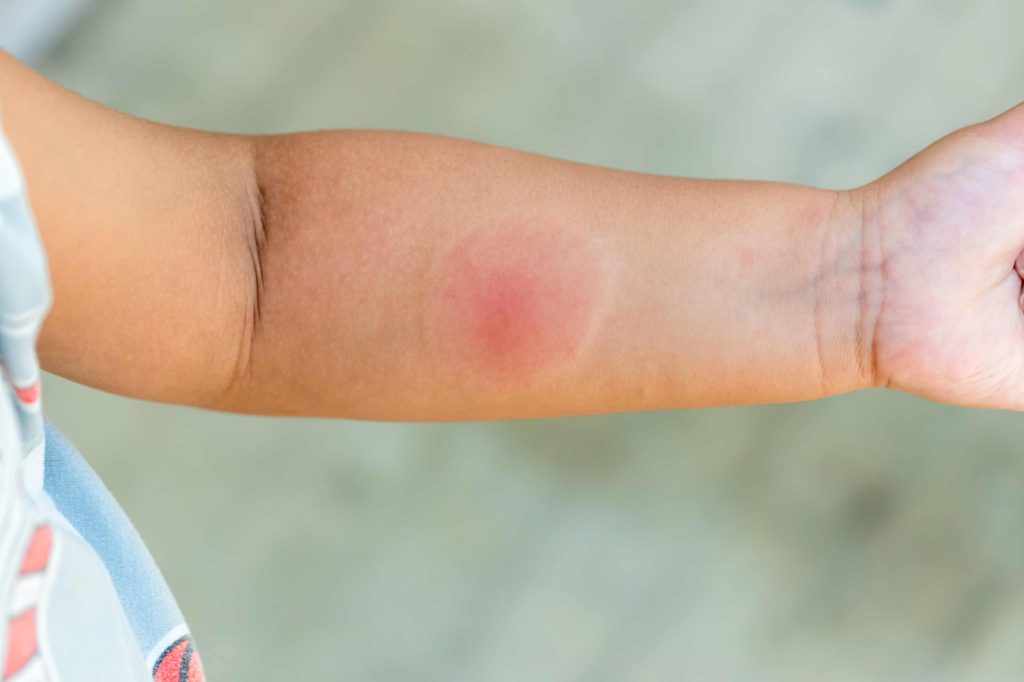
Insect bites are often minor and can be treated easily at home. However, there are instances when an insect bite can lead to more severe symptoms, infections, or allergic reactions that require medical attention. Knowing when to seek help and the best treatments for insect bites can help you manage effectively and avoid complications.
In this guide, we’ll walk you through the signs of serious insect bites, the best treatment options, and when you should consult our experts for insect bites.
When Should I Worry About an Insect Bite?
Most insect bites are harmless, resulting in minor itching, redness, or swelling. However, there are some instances when you should worry about a bite and seek medical attention. Here are some common signs to watch for:
1. Swelling and Redness Spreading: It’s normal for a bite to be red and swollen, but if the swelling or redness spreads significantly, it could be a sign of an infection. You might also notice heat or tenderness around the bite. In this case, seeking treatment for an insect bite is essential to prevent complications.
2. Severe Pain: Insect bites can cause some discomfort, but severe or worsening pain may indicate a more serious issue. It’s particularly important to get checked if the pain does not subside after a few hours or becomes more intense.
3. Fever or Chills: If you develop a fever or chills after an insect bite, it could indicate a more serious infection. This may be a sign that bacteria have entered your bloodstream, which requires prompt medical treatment.
5. Blistering or Oozing: If a bite forms a blister or begins to ooze, it’s often a sign of infection. Infection from insect bite treatment should begin as soon as possible to prevent the condition from worsening.
6. Difficulty Breathing or Swelling in the Face/Throat: This is a sign of a severe allergic reaction (anaphylaxis) and is a medical emergency. If you experience difficulty breathing, swelling of the face, lips, or throat, or dizziness after a bite, you should seek immediate medical help.
How Do You Know If a Bite Is Serious?
It’s important to distinguish between a mild reaction and a serious one that requires medical intervention. Here are some clear indicators that a bite might be more serious:
Signs of Infection
If you notice pus, increased warmth, or red streaks around the bite, it could indicate an infection. Infection from insect bite treatment should start promptly, and in most cases, this involves prescribed antibiotics.
Allergic Reactions
Some people are allergic to insect bites or stings, and their bodies may react more severely. Signs of an insect bite allergy include widespread rash, intense itching, and difficulty breathing. Insect bite allergy treatment often involves antihistamines and, in severe cases, an epinephrine injection.
Intense Itching
Itching is common after an insect bite, but if the itching becomes unbearable or is accompanied by other symptoms like swelling or rash, it’s important to seek insect bite itch treatment. Over-the-counter antihistamines or steroid creams can help, but if these are not effective, a doctor might prescribe a stronger treatment.
Bite from a Venomous Insect
Some insects, such as spiders, can cause more serious bites. If you suspect you’ve been bitten by a venomous insect and experience intense symptoms like cramping, muscle pain, or nausea, it’s important to seek medical attention.
Best Treatment for Insect Bites
The best treatment for insect bites depends on the severity of your symptoms. For most mild reactions, home treatments can help soothe discomfort and prevent infection. Here’s how to treat an insect bite at home:
- Clean the Area: Wash the bite with soap and water to prevent infection from an insect bite.
- Apply a Cold Compress: A cold compress can help reduce swelling and numb the area.
- Use Anti-Itch Creams: Calamine lotion or hydrocortisone cream can help relieve itching and inflammation. For intense itching, insect bite itch treatment may require oral antihistamines.
- Keep the Area Elevated: If the bite is on your leg or arm, elevating the area can help reduce swelling.
For more severe cases, medical treatment for insect bites might include antibiotics (for infected bites), antihistamines (for allergic reactions), or even an EpiPen (for anaphylaxis).
Insect Bite Worries? Get Local Treatment at Aroga Pharmacy
If you’re experiencing symptoms from an insect bite that aren’t improving or are concerned about an allergic reaction or infection, it’s important to get medical advice.
Book an appointment for advice at Aroga Pharmacy for professional treatment and guidance on managing insect bites. Whether you’re in Farnham Royal, Fulmer, or Gerrards Cross, the team at Aroga Pharmacy at Farnham Common can help you manage your symptoms and prevent complications.
